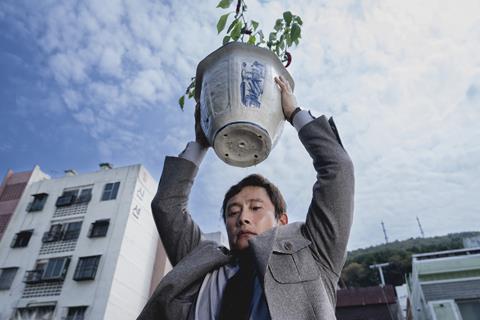The director’s Venice Competition title stars Lee Byung-hun as a family man who turns to desperate measures

Dir: Park Chan-wook. South Korea. 2025. 139 mins.
Criminals in the films of Park Chan-wook tend to be brilliant, devious, Machiavellian creatures, adept at the long game and staying several moves ahead of those who would bring them to justice. Not so Man-su (Squid Game’s Lee Byung-hun), the endearingly klutzy protagonist of No Other Choice. A former paper mill middle manager whose job is abruptly terminated, Man-su turns to desperate and increasingly deadly measures to secure reemployment in a shrinking job market. He is, it becomes clear, supremely ill-suited to a rampage of violence.
Balances psychological tension against hilarious comic set pieces
But while the crime spree may be inept, Park’s filmmaking is as elegant as ever, in a wildly enjoyable picture that balances psychological tension against giddily hilarious comic set pieces. No Other Choice was adapted from Donald Westlake’s satirical novel, The Ax (which also previously provided the source material for a French-language version,The Axe, by Costa-Gavras). The book was written in 1997, but the story, about a family man’s desperation in the face of swathing job cuts across his industry could hardly be more relevant in a time of AI (something that Park nods to in a darkly sardonic closing coda).
Park’s follow-up to Decision To Leave, which earned him the Best Director prize at Cannes in 2022, No Other Choice is less teasingly serpentine in its plotting than its predecessor but the mordantly comic tone should earn it a warm reception at further festivals (following its premiere in the main competition in Venice, it screens at TIFF, New York and opens Busan) and beyond. Neon will release in the US; Mubi, reteaming with Park after releasing Decision To Leave, holds multiple territories including UK/Ireland.
The film opens with the Adagio from Mozart’s Piano Concerto No. 23, a piece of music so honkingly obvious that it can now only be employed ironically in films (it’s also prominently used in The Death Of Stalin). Sure enough, the kitsch vision we see of a picture-perfect life turns out to be precarious and fleeting. In the lush, colour-saturated Eden that is the garden of his mid-century modern house, Man-su barbecues eel, generously gifted by his company. His gorgeous, doting wife Miri (Son Yej-in) and their two kids gather for a group hug. A delicate confetti of blossom petals falls. They even have a pair of Golden Retrievers, for goodness sake. Life is charmed.
Until it isn’t. Man-su’s job is unceremoniously terminated (the company had “no other choice”, he’s told). As the months without work stretch past the year mark, Man-su hauls boxes in a warehouse and the mortgage company starts to make ominous noises about foreclosure. Miri takes a part time job, as a dental hygienist to an impossibly handsome dentist (as if Man-su’s male pride wasn’t dented enough). And she enforces belt-tightening all round: no more ballroom dance classes for Man-su and Miri; the dogs are temporarily rehomed; they even cancel Netflix (the latter prompts a sharp, horrified intake of breath from everyone who hears the news).
Realising that he’s on the brink of losing everything, Man-su takes action. Equipped with his father’s North Korean-made service revolver, Man-su sets about eliminating the competition. He’s about as suited to a life of crime as William H. Macy was in Fargo. But unlike Macy’s character and despite his petty jealousy of his wife and the whole murdering innocent rivals business, Lee still manages to make Man-su a somewhat sympathetic character. This is partly thanks to the way Park smartly defangs Man-su’s crimes by ramping up the absurdity and physical comedy (at times, it’s like watching Mr Bean blundering through an assassination). Man-su’s first attempt, targeting an executive-turned-sloppy drunk, is a gloriously funny set piece, accompanied by peppy Korean pop blasted at ear-shredding volumes.
Beneath the broad comedy and satire, however, is a minor key refrain. The film is extremely amusing, certainly, but it’s simultaneously a poignant study of the desperation of the long-term jobless and the needless cruelty of the corporate world. It’s also a warning. As AI chews increasingly large chunks out of the job market, we could all be Man-su. The question is, who will be the one holding the North Korean service revolver when the time comes?
Production company: Moho Film, KG Productions
International sales: CJ ENM Co., Ltd. bokyeong.bhang@cj.net
Producers: Park Chan-wook, Back Jisun, Michèle Ray Gavras, Alexandre Gavras
Screenplay: Park Chan-wook, Lee Kyoung-mi, Don McKellar, Jahye Lee
Cinematography: Kim Woo-hyung
Editing: Kim Sang-beom, Kim Ho-bin
Production design: Ryu Seong-hie
Music: Cho Young-wuk
Main cast: Lee Byung-hun, Son Yej-in, Park Hee-soon, Lee Sung-min, Yeom Hye-ran, Cha Seung-won















![[L-R]: Amanda Villavieja, Laia Casanovas, Yasmina Praderas](https://d1nslcd7m2225b.cloudfront.net/Pictures/274x183/6/4/1/1471641_pxl_20251224_103354743_618426_crop.jpg)








